牛津上海版英语九上Uint2《Greatminds》word教学参考
Unit 2 Great minds 教案-公开课-优质课(上教版九上精品)
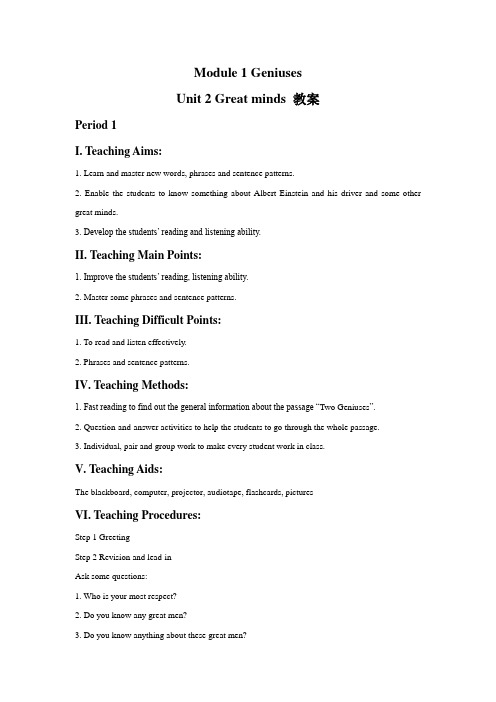
Module 1 GeniusesUnit 2 Great minds 教案Period 1I. Teaching Aims:1. Learn and master new words, phrases and sentence patterns.2. Enable the students to know something about Albert Einstein and his driver and some other great minds.3. Develop the students’ reading and listening ability.II. Teaching Main Points:1. Improve the students’ reading, listening ability.2. Master some phrases and sentence patterns.III. Teaching Difficult Points:1. To read and listen effectively.2. Phrases and sentence patterns.IV. Teaching Methods:1. Fast reading to find out the general information about the passage “Two Geniuses”.2. Question-and-answer activities to help the students to go through the whole passage.3. Individual, pair and group work to make every student work in class.V. Teaching Aids:The blackboard, computer, projector, audiotape, flashcards, picturesVI. Teaching Procedures:Step 1 GreetingStep 2 Revision and lead-inAsk some questions:1. Who is your most respect?2. Do you know any great men?3. Do you know anything about these great men?4. Do you know anything about Albert Einstein?Step 3 Presentation for readingAsk a question:Do you want to know something about the great man Albert Einstein?Step 4 Fast reading1. Give 2 minutes to read passage quickly.2. Answer questions.3. Repeat the right answer and write them on the blackboard.Step 5 Careful reading1. Explain some main phrases and sentence patterns.2. Give 4 minutes to read passage carefully and do the exercises in pairs.3. Check the answer: Ask a team of students do it one by one.Step 6 Practice1. Summarize the main ideas of the passage.2. Divide students to groups to discuss the passage and other great men.Step 7 Consolidation and summary1. Emphasize the phrases and sentence patterns.2. Retell some information about the great men.Step 8Homework: Exercise book, review.Period 2I. Teaching Aims:1. Learn and master how to use infinitives after nouns, as subjects and after the verb to be.2. Learn to leave and take phone messages.3. Learn to tell a story about a famous person.4. Learn to write short stories.II. Teaching Main Points:1. Improve the students’ speaking, writing ability.2. Master some phrases, sentence patterns and grammar.III. Teaching Difficult Points:Phrases, sentence patterns and grammarIV. Teaching Methods:1. Question-and-answer activities to help the students to learn better. 3. Individual, pair and group work to make every student work in class. V. Teaching Aids:The blackboard, computer, projector, audiotape, flashcards, pictures VI. Teaching Procedures:Step 1 GreetingStep 2 Revision and lead-in1. Free talk.2. Review the grammar they have learnt.3. Lead in the grammar we need to learn in this unit.Step 3 PresentationTell the students some usage of infinitives.Step 6 Practice1. Summarize the main usage of the grammar.2. Divide students into groups to practice the grammar.Step 7 Consolidation and summary1. Emphasize the grammar.2. Ask some students to retell the usage of the grammar.Step 8Homework: Exercise book, review.。
沪教牛津版-英语-九上--《Unit2 》教案3
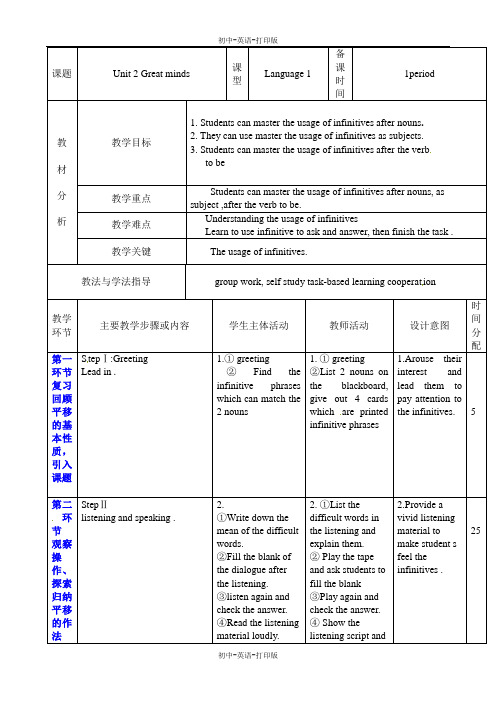
课题Unit 2 Great minds 课型Language 1备课时间1period教材分析教学目标1. Students can master the usage of infinitives after nouns.2. They can use master the usage of infinitives as subjects.3. Students can master the usage of infinitives after the verbto be教学重点Students can master the usage of infinitives after nouns, assubject ,after the verb to be.教学难点Understanding the usage of infinitivesLearn to use infinitive to ask and answer, then finish the task .教学关键The usage of infinitives.教法与学法指导group work, self study task-based learning cooperat ion教学环节主要教学步骤或内容学生主体活动教师活动设计意图时间分配第一环节复习回顾平移的基本性质,引入课题S tepⅠ:GreetingLead in .1.① greeting②Find theinfinitive phraseswhich can match the2 nouns1.① greeting②List 2 nouns onthe blackboard,give out 4 cardswhich are printedinfinitive phrases1.Arouse theirinterest andlead them topay attention tothe infinitives. 5第二环节观察操作、探索归纳平移的作法StepⅡlistening and speaking .2.①Write down themean of the difficultwords.②Fill the blank ofthe dialogue afterthe listening.③listen again andcheck the answer.④Read the listeningmaterial loudly.2. ①List thedifficult words inthe listening andexplain them.② Play the tapeand ask students tofill the blank③Play again andcheck the answer.④ Show thelistening script and2.Provide avivid listeningmaterial tomake student sfeel theinfinitives .25StepⅢ: consolidation. ⑤Choose a subjectand make dialoguewith the partners.3.①Read a passageand fill in the blank.② check the answer.ask students toread the listeningmaterial loudly.⑤Ask students tochoose a subjectand make dialoguewith the partners.3. ①Provide a bitlonger ,more difficultpassage, askstudents to readand fill in theblank .② check theanswer. 3. Deep theunderstandingof theinfinitives .1第三环节课堂练习StepⅣ: Summary 4. ①Discuss thestructure of noun+infinitive,Infinitive as subject,Infinitive after theverb to be.② Summarize thefeature of them..4.Lead the studentsto understandnoun+infinitiveInfinitive assubject,Infinitive after theverb to be.And discuss theirusage② Lead thestud ents tosummarize thefeature of them.4..Cultivatetheir habit oftaking notes.5。
牛津版九年级英语上册Unit2Greatminds教案4
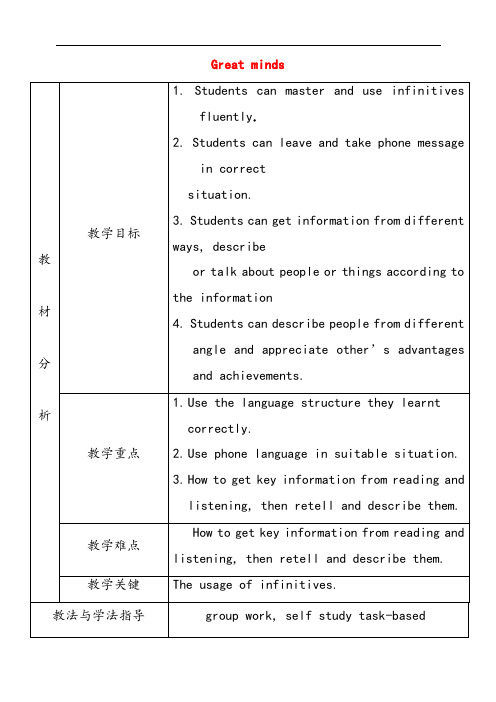
3.Make the classlivelyandprepare forthenext step .
10
4
第三环节 课堂练习
StepⅣ:talk time
StepⅤ:show time
StepⅤ:summary
教学难点
How to get key information from reading and listening, thenretellanddescribethem.
教学关键
Theusage of infinitives.
教法与学法指导
group work, self study task-basedlearning cooperation
or talk about people or things according to the information
4.Studentscan describe people from different angle and appreciate other’s advantagesandachievements.
4. ①Discuss in groups of 5,divide the taskandchoose a leader.
②Work according to the teacher’s information then share with each other.
.
5.Amember in the group presenttheresult they discuss by the form of making a phone call.
沪教牛津版-英语-九上--Unit 2 Great minds 爱因斯坦的小故事

时间与永恒有一次,一个美国女记者采访爱因斯坦,问道:“依您看,时间和永恒有什么区别呢?”爱因斯坦答道:“亲爱的女士,如果我有时间给您解释它们之间的区别的话,那么,当你明白的时候,永恒就消失了!”记电话号码爱因斯坦的一位女朋友,给他打电话。
末了要求爱因斯坦把她的电话号码记下来,以便以后通电话。
“我的电话号码很长,挺难记。
”“说吧,我听着。
”爱因斯坦并没有拿起笔。
“24361。
”“这有什么难记的?”爱因斯坦说,“两打与十九的平方,我记住了。
”“相对论”妙解有一次,群众包围了从德国移居美国的科学家爱因斯坦(1879-1955年)的住宅,要他用“最简单的话”解释清楚他的“相对论”。
当时,据说全世界只有几个高明的科学家看得懂他关于“相对论”的著作。
爱因斯坦走出住宅,对大家说:“比方这么说——你同你最亲的人坐在火炉边,一个钟头过去了,你觉得好像只过了5分钟!反过来,你一个人孤孤单单地坐在热气逼人的火炉边,只过了5分钟,但你却像坐了一个小时。
——唔,这就是相对论!”大纸篓爱因斯坦被带到普林斯顿大学他的办公室那天,有人问他需要什么工具。
“我看,一张书桌或台子,一把椅子和一些纸张铅笔就行了。
啊,对了,还要一个大废纸篓。
”他说。
“为什么要大的?”“好让我把所有的错误都扔进去。
”理论的成败与国籍20世纪30年代,爱因斯坦有一次在巴黎大学演讲时说:“如果我的相对论证实了,德国会宣布我是个德国人,法国会称我是世界公民。
但是,如果我的理论被证明是错的,那么,法国会强调我是个德国人,而德国会说我是个犹太人。
”意识爱因斯坦的二儿子爱德华问:“爸爸,你究竟为什么成了著名人物呢?”爱因斯坦听后,先是哈哈大笑,然后意味深长地说:“你瞧,甲壳虫在一个球面上爬行,可它意识不到它所走的路是弯的,而我却能意识到。
”邪恶课堂上,大学教授问他的学生甲:“上帝创造了一切吗?”学生甲勇敢地回答说:“是的,他创造了一切!”“上帝创造了每一样东西吗?”教授又问。
牛津上海版英语九上Uint 2《Great minds》ppt课件

动词不定式和疑问词连用
不定式可以和疑问代词who, what, which及疑问副词when, how, where等连用, 构成不定式短语,在句子中作主语、宾语、表语等。现将这种用法归纳如下。 一、“疑问词+动词不定式”结构有两种形式: 1. “疑问词+to+动词原形” I don’t know what to say. 我不知道说什么。 Can you tell me how to make a paper boat? 你能告诉我怎样做一只纸 船吗? 2. “疑问词+名词+to+动词原形” I don’t know which topic to choose. 我不知道选哪个题目。
不定式作宾语
不定式作宾语 1) 动词+ 不定式 afford aim appear agree arrange ask be decide bother care choose come dare demand desire determine expect elect endeavor hope fail happen help hesitate learn long mean manage offer ought plan prepare pretend promise refuse seem tend wait wish undertake 举例: The driver failed to see the other car in time. 司机没能及时看见另一辆车。 I happen to know the answer to your question. 我碰巧知道你那道问题的答案。
不定式作表语
1、表示目的。 The next step is to make sure that you know exactly what is required. 下一步你要 真正弄清楚需要的是什么。 2、表示事态发展的结果、预期的结果、不幸的命运或语言。 He was to perish in a shipwreck and to l-eave a wife and two children.后来他在 一次船只失事中死了,留下了妻子和两个孩子。 3、用于第一人称疑问句,表示征求意见。 What am I to say if they ask me the question? 要是他们问我这个问题,我该怎么回答 呢? 4、用于被动语态,相当于can/could,should,ought to,must,具有情态意义。 You are to be rewarded.你应该受到奖励。(should) It’s nowhere to be found.哪儿也找不到它。(can’t be) These books are not to be sold.这些书不应该卖掉。(ought not to be) 5、表示“同意、安排、命令、决定、劝告、意愿、禁止”等。 They are to marry next week.他们将在下周结婚。(安排) Children are not to smoke.儿童不准吸烟。(禁止) You must be patient and persistent if you are to succeed. 想要成功,就必须有耐心, 有毅力。(愿望) 6、不定式作表语,可用主动形式表示被动意义。 She is to blame.她应该受到责备。
九年级英语 牛津版U2 Great Minds示范课教学设计

Analyze the characters
• Einstein’s driver Hans often said to him, “It’s a pleasure to drive a genius like you, Dr Einstein.”
• Einstein laughed, “It’s a pleasure to drive a genius like you, Hans.”
He has many different sides.
He has many different sides, too.
Great people and ordinary people, both have many different sides.
Know ourselves better and find out our shining points!
Einstein’s driver Hans often said to him, “It’s a pleasure to drive a genius like you, Dr Einstein.”
Einstein laughed, “It’s a pleasure to drive a genius like you, Hans.”
/turning point
Hans solved the problem by asking Einstein to answer the question.
On the way to a university for a lecture, Einstein felt tired and Hans offered to give the lecture for him.
牛津译林版初中英语九年级上册英语Unit2--Great-minds精品教案

牛津译林版初中英语九年级上册英语Unit2 精品教案学生学校年级次数第次科目英语教师日期时段课题 Unit2 Great minds教学重点1.熟记Unit2重要单词、短语及句型并会准确运用;2.掌握重要语法知识点---不定式3 掌握故事特点,能较好地整合故事情节并合理安排段落教学难点中低频词组的掌握语法的实际运用教学目标能够阅读和描述名人小故事能够会运用所学的单词和短语能够从广播节目中获取信息。
如个人情况,数字等教学步骤及教学内容一、课前热身:Small-test :等二、内容讲解:步骤一:课文基础知识巩固复习1.单词与短语:读、听默,检查学生对本单元的词汇掌握情况2. 单词与短语的巩固练习(单词拼写、完成句子)我们要帮助那些遇到麻烦的人。
We should help those _______ _______.3. 课文内容及重点句型、短语表达及用法巩固复习I’ve listened to your lecture so many times that I’ve learnt it by heart.步骤二:课文同步语法知识点讲解及中考链接练习步骤三:综合巩固练习(找出学生未掌握的知识点)三、课堂小结:四四、作业布置:管理人员签字:日期:年月日作1、学生上次作业评价:○好○较好○一般○差备注:2、本次课后作业:课堂小结家长签字:日期:年月日Unit2 Great minds讲义Name: Date:Step 1:Check about the homework and explain about the mistakes; a five minute check about last class.Step 2: Lead in to this Unit:Step 3: Explain the language points in the reading part and the more practice part.Step 4: Explain the grammarStep 5: Do some exercises related to this unitStep 6: summarize what we learnt in the classReading一、词汇讲解let my audience d own.1.I wish I could avoid giving my lecture tonight, Hans, but I don’t want to我希望我能避开今晚的讲座,汉斯,但是我不想让我得观众失望。
2021秋牛津上海版英语九上Uint2《Greatminds》word知识点讲解

2021秋牛津上海版英语九上Uint2《Greatminds》word知识点讲解Unit 2 Great minds课文Word changes:fiction(n.)—fictional (adj. 虚构的, 小说的)—fictionist(n. 小说家, 创作家) genius(n. 天才、才能) talent, gift idiot白痴gift(n. 天赋)= talent(n. 才能)--- n. 礼物) = presentgifted(adj. 有天赋的, 有才华的)universe(n. 宇宙)—universal(adj. 普遍的,通用的,宇宙的)work(v. 运行)--- n. 工作a piece of workworks n. 工厂(视为单数) a gas works 文学艺术作品(视为复数) curiosity(n. )--- curious(adj. 好奇的)--- curiously ( adv.好奇地)humour/ humor (n. 幽默)—humorous (adj. 幽默的)theory(n. 理论)--- theoretical (adj. 理论上的)----theoretically(adv.理论上)--- theorist (n. 理论家)theory of relativity: [物]相对论distant(adj.)--- distance(n. 距离)perfectly(adv.完美地)--- perfect(adj. 完美的)---perfection(n. 完美)--- perfectionist(n. 完美主义者)applause(n. 鼓掌)--- applaud (v. 鼓掌、颂扬)--- applausive(adj. 拍手欢呼的) wood n. 木头woods 树林,森林wooden adj. 木制的13. receptionist n. 接待员receive v. 收到receipt n. 收据receiver n. 听筒purpose n. 目的, 意图; vt. 打算, 决意purposeful adj. 有目的的,有决心的purposeless adj. 无目的14.observatory n. 天文台---observe v. 观看---observation n. 观看---observer n. 观看者15. research n. v. 研究;调查researcher n. 研究人员16. harmless adj. 无害的---harmful adj. 有害的---harmfully adv. 有害地--- harm n. v. 损害17. regard n. 关怀; 考虑, 问候; vt. 视为; 尊重; 凝视,regards n. 问候;致意best regards18. astronomy ---astronomer 天文学家astronomical (adj.)天文学的,天体的19. enter (v.) 进入= come into entrance (n.) 入口20. produce (vt. & vi.)生产--producer (n.) 生产者, 制造product ( n.) 产品21. fortune n. 庞大的财宝, 财产n. 机会, 运气, 转机= luck( adj ) fortunate –fortunately (adv.)unfortunate ---unfortunatelyluck—lucky—luckily unlucky—unluckily22. outstand v.〈古〉忍耐,停留,凸出,突出,卓然独立outstanding adj.突出的; 杰出的23 encourage—encouragement24.daydream –daydreamingphrases1.regard…as = consider...as=think of…as 把……视为/当作2.a gift for= a talent for = a present for有……的天赋3.attempt to do sth.=try to do sth. 尝试做某事4.have a sense of humor=be humorous 有幽默感5.work out = solve=deal with 解决,处理(问题)6.work= operate =run 操作运行7.on one’s way to sw. 在去往…的路上8.receive an invitation 收到邀请9. give a lecture =make a lecture=have a talk/speech 做演讲10.let sb down = disappoint sb.= make sb. disappointed 让某人败兴11.What is the distance= How far is it 多远12.perfectly=without any mistake 完美地13.be pleased with sth =be satisfied with 让…中意It’s a pleasure (for sb) to do sth 有幸/荣幸做某事14.learn sth. by heart= know sth. by heart =remember=memorize熟记15.lead sb to =take sb to 带某人去lead to sth.= cause sth. 导致,引起16.find out=discover 找到发觉17.be in trouble in doing sth.= have difficulty in doing sth. 做某事有苦恼/困难18.In fact=Actually =As a matter of fact19.offer sth. for sb. =offer sb, sth.=supply sb. with sth. =supply sth. to sb. =provide sb. with sth.=provide sth. for sb. 提供某人某物20.so + adj. + that从句=too + adj. to do= such + n. + that从句21.join in the applause=take part in the applause加入到鼓掌中22.have no idea+宾从= don’t know+宾从不明白23.take/leave a message 带/留口信24.in reply to sth.= to answer sth. 回复回答25.be in trouble / danger 处于困难或危险中26. in fact / as a matter of fact 实际上;事实上27.have ability to do sth. 有能力做……28. plan to do sth. 打算做……29. go on a trip to … 去…进行旅行30. need ( want / require ) to be done/need doing 需要被做…….31. all sorts of trouble 各种困难32. work as 任…职, 当…33. call sb. back= return one’s call回某人34. put sb. through to sb. 为...接通()到..35. at the beginning of 在……的开始时36. make sure 确信37. do a research on ... 做有关…….的研究38. at the entrance of.. 在……入口处39. leave behind sth 身后留下……25.II. Paraphrasing:1. I don’t know how I can improve my English.I don’t know how to improve my English.2. We don’t want to make our teacher disappointed.We don’t want to let our teacher down.3. Jack made a perfect answer and the professor was very pleased.Jack answered perfectly and the professor was very pleased.4.I’m so tired that I can’t finish my homework today.I’m too tired to finish my homework today.5. Charlie Chaplin was a man with a sense of humor.Charlie Chaplin was a man who was good at making people laugh.6. Hans has learnt the lecture by heart.Hans has remembered the lecture.7. Hans gave the lecture perfectly instead of Einstein.Hans gave the lecture without any mistakes instead of Einstein.8. The question is so easy that even my driver knows the answer.The question is easy enough for my driver to know the answer.9. Einstein received invitations from the professors in the universities to explain his theories.The professors in the universities invited Einstein to explain his theories.10. I regard him as my best friend and we share everything in life.I consider him as my best friend and we share everything in life.11. Einstein had the gift of curiosity.Einstein had the talent of curiosity.12. Einstein was pleased to drive a genius like Hans.Einstein felt happy to drive a genius like Hans.13. He offered me a glass of wine.13. He gave me a glass of wine.II.同义短语。
九年级英语 牛津版U2 Great Minds示范课教学设计
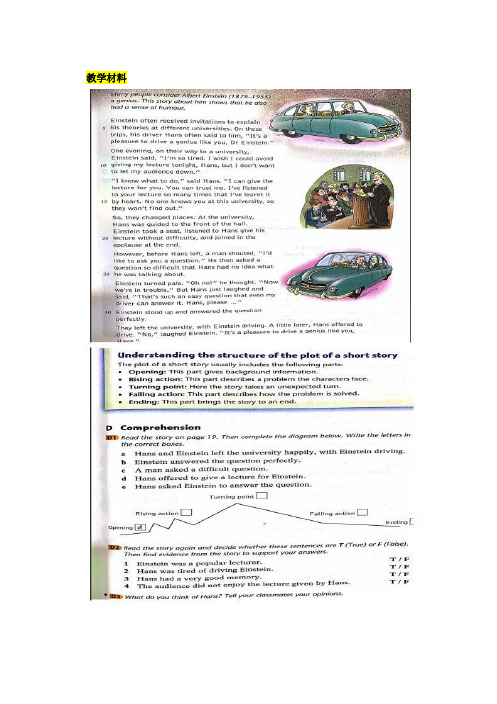
2)学生在对故事深入理解后,对故事内容进行口头续写,这一迁移
创新类活动既是对学生故事阅读结构化知识框架的巩固,也是培养学
生思维品质中的创新性,有助于提升解决问题的能力
教学目标
学完本课后,学生可以:
1)在语言能力方面:对“故事”这个语篇有更清晰的了解,
学习活动观为指导,尝试将初高中阅读课教学更好地进行衔接,使学
生在英语学习方面能更顺畅地过渡。英语学习活动观有机地整合了六
要素,在初中的阅读课中落实是非常有意义的,能促使教师转变教学
方式,以学生为主体梳理结构化知识,学生会慢慢地在自己的输出中
有所体现。本次课是初步的探索,在最后的故事续写中,学生踊跃回
深刻的话语写在学案
由生成,通过他
他们印象深刻的话语
story mountain相应的
们的主动阅读,
部分下
思维更加专注,
对文本阅读会
更仔细
通过问题引导学生从人
学生小组之间互相讨
让学生在情节
物的话语中推导出人物
论分享,最后与全班分
的框架中,通过
个性
享
人物语言合理
推测出人物的
性格特点,培养
逻辑性,从另一
个角度整合文
知道如何在故事情节的框架内,由人物语言推导出人物个性
2)在文化意识方面:明白无论是伟人还是普通人,个性都有
许多面的道理,从而保持开放包容的态度,多阅读多经历,而不是轻
易下定论
3)在思维品质方面:根据所学内容,对故事进行合理的口头
续写(重点在故事的合理性方面)
教学重难点
教学重点
1)学生能意识到记叙文中的语言与人物个性塑造的关系,即
牛津版九年级英语上册Unit2Greatminds教案5

③Mastersomekey words which can describe people, know about different aspects ofpeopledescribing, try to write
individually.
Work in groups to ask andanswer questions.
Then practice hedialoguewith each other.
3.①Describea picture.
②Master some key words to describe people according to the exercises.
15
15
第三环节 课堂练习
StepⅣ: Post-task
writing
4.Write an articleaccordingto the pictureandwords information.
4.List some famous people’sphotosand give some key words, help students finish a story about a person individually.
教学环节
主要教学步骤或内容
学生主体活动
教师活动
设计意图
时间
分配
第一环节 复习回顾平移的基本性质,引入课题
StepⅠ:lead in.
1.Listenandfill in the correct time.
牛津上海版英语九上Uint 2《Great minds》word单元教案
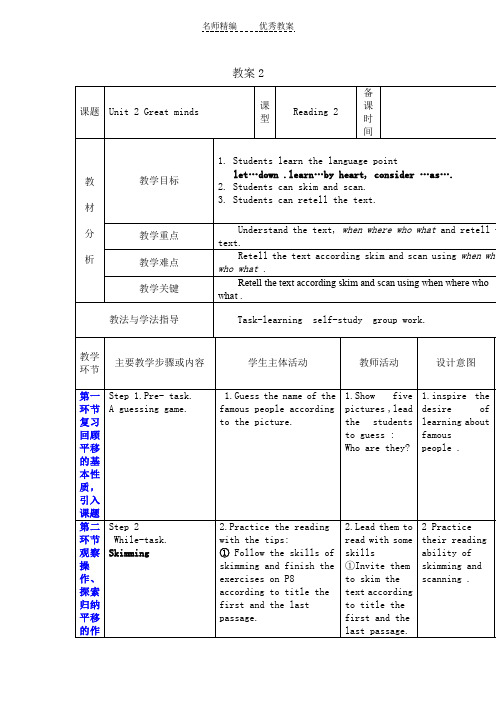
Understand the text,when where who whatand retell the text.
教学难点
Retell the text according skim and scan usingwhen where who what.
教学关键
Retell the text according skim and scan usingwhen where who what.
3.Help them to make an key line to describe the text according to some hints.
3.Enable the students to talk about the content of the text.
10
第四环节 课时小结
Step 4
.
②Play the tape for the students to finish a passage.
③Invite the students to read the text carefully and translate the text with each other ,then finish the exercises on P20-21.
教法与学法指导
Task-learning self-study group work.
教学环节
主要教学步骤或内容
学生主体活动
教师活动
设计意图
时间
分配
第一环节 复习回顾平移的基本性质,引入课题
Step 1.Pre- task.
A guessing game.
1.Guess the name of the famous people according to the picture.
牛津深圳版英语九年级上册:Unit 2 《Great minds》 教学设计3

牛津深圳版英语九年级上册:Unit 2 《Great minds》教学设计3一. 教材分析《牛津深圳版英语九年级上册:Unit 2 Great minds》是本册教材中的第二单元,本单元的主题是围绕“伟大的心灵”,通过学习课文和各种活动,使学生了解并欣赏到不同领域中伟大人物的智慧和品质。
本单元的主要内容包括:课文阅读、词汇学习、语法讲解、听力练习、口语表达和写作训练等。
二. 学情分析九年级的学生已经具备了一定的英语基础,能够听懂并运用基本的英语进行日常交流。
但是,对于一些较复杂的语法结构和词汇,学生可能还需要进一步的讲解和练习。
同时,学生对于课文的理解和对于听力材料的处理能力也需要加强。
三. 教学目标1.能够理解并运用本单元的词汇和语法知识。
2.能够听懂并能够运用本单元的内容进行口语表达。
3.能够通过阅读课文,了解并欣赏到伟大人物的智慧和品质。
4.能够通过写作训练,提高自己的写作能力。
四. 教学重难点1.词汇和语法知识的讲解和运用。
2.课文的理解和对于听力材料的处理能力。
3.写作训练的指导和方法。
五. 教学方法1.任务驱动法:通过各种任务,使学生在实践中学习和运用英语。
2.情境教学法:通过设置各种情境,使学生在真实的环境中学习和运用英语。
3.合作学习法:通过小组合作,使学生在互动中学习和运用英语。
六. 教学准备1.课文和相关听力材料。
2.词汇和语法讲解的PPT。
3.相关的写作训练材料。
七. 教学过程1.导入(5分钟):通过提问,引导学生回顾上节课的内容,同时引入本节课的主题。
2.呈现(15分钟):通过PPT或者黑板,讲解本节课的词汇和语法知识。
在讲解的过程中,可以通过举例或者设置情境,使学生更好地理解和运用。
3.操练(15分钟):通过各种练习,让学生运用所学的词汇和语法知识。
可以设置一些小组活动,让学生在互动中学习和运用。
4.巩固(10分钟):通过一些听力材料或者阅读材料,让学生进一步巩固所学的知识。
沪教版牛津英语九年级上unit 2 Great minds(P 4)魏东
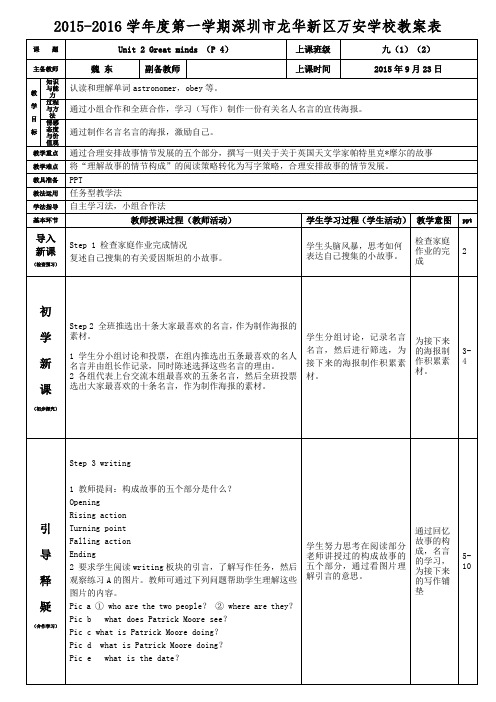
2015-2016学年度第一学期深圳市龙华新区万安学校教案表课题Unit 2 Great minds (P 4)上课班级九(1)(2)主备教师魏东副备教师上课时间2015年9月23日教学目标知识与能力认读和理解单词astronomer,obey等。
过程与方法通过小组合作和全班合作,学习(写作)制作一份有关名人名言的宣传海报。
情感态度与价值观通过制作名言名言的海报,激励自己。
教学重点通过合理安排故事情节发展的五个部分,撰写一则关于关于英国天文学家帕特里克*摩尔的故事教学难点将“理解故事的情节构成”的阅读策略转化为写字策略,合理安排故事的情节发展。
教具准备PPT教法运用任务型教学法学法指导自主学习法,小组合作法基本环节教师授课过程(教师活动)学生学习过程(学生活动)教学意图ppt导入新课(检查预习)Step 1 检查家庭作业完成情况复述自己搜集的有关爱因斯坦的小故事。
学生头脑风暴,思考如何表达自己搜集的小故事。
检查家庭作业的完成2初学新课(初步探究)Step 2 全班推选出十条大家最喜欢的名言,作为制作海报的素材。
1 学生分小组讨论和投票,在组内推选出五条最喜欢的名人名言并由组长作记录,同时陈述选择这些名言的理由。
2 各组代表上台交流本组最喜欢的五条名言,然后全班投票选出大家最喜欢的十条名言,作为制作海报的素材。
学生分组讨论,记录名言名言,然后进行筛选,为接下来的海报制作积累素材。
为接下来的海报制作积累素材。
3-4引导释疑(合作学习)Step 3 writing1 教师提问:构成故事的五个部分是什么?OpeningRising actionTurning pointFalling actionEnding2 要求学生阅读writing板块的引言,了解写作任务,然后观察练习A的图片。
教师可通过下列问题帮助学生理解这些图片的内容。
Pic a ① who are the two people?② where are they?Pic b what does Patrick Moore see?Pic c what is Patrick Moore doing?Pic d what is Patrick Moore doing?Pic e what is the date?学生努力思考在阅读部分老师讲授过的构成故事的五个部分,通过看图片理解引言的意思。
- 1、下载文档前请自行甄别文档内容的完整性,平台不提供额外的编辑、内容补充、找答案等附加服务。
- 2、"仅部分预览"的文档,不可在线预览部分如存在完整性等问题,可反馈申请退款(可完整预览的文档不适用该条件!)。
- 3、如文档侵犯您的权益,请联系客服反馈,我们会尽快为您处理(人工客服工作时间:9:00-18:30)。
Chapter 2 Great minds (一)
Reading
Two geniuses
Many people consider ()Albert Einstein a genius. This story about him shows that he also had a sense of humour().
Einstein often received invitations to explain his theories at different universities. On these trips, his driver Hans often said to him, “ It‟s a pleasure to drive a genius like you, Dr Einstein.”
One evening, on their way to()a university, Einstein said, “I …m so tired. I wish I could avoid giving ()my lecture tonight, Hans, but I don‟t want to let my audience down().”
“ I know what to do,”said Hans. “ I can give the lectured for you. You can trust me. I‟ve listened to your lecture so many times that I‟ve learnt it by heart(). No one kn ows you at this university, so they won‟t find out ().”
So, they changed places. At the university, Hans was guided to the front of the hall.Einstein took a seat(), listened to Hans give his lecture without difficulty(), and joined in()the applause at the end().
However, before Hans left, a man shouted, “ I‟d like to ask you a question.” He then asked a question so difficult that ()Hans had no idea ()what he was talking about. Einstein turned pale().“ Oh n o!” he thought. “ Now we are in trouble(). “But Hans just laughed and said, “ That‟s s uch an easy question that()even my driver can answer it. Hans ,please.....
Einstein stood up and answered the question perfectly. They left the university, with Einstein driving. A little later(), Hans offered to drive(). “No, ”laughed Einstein. “It‟s a pleasure to drive a genius like you, Hans”
Phrases :
1.listen to sb. do sth. 听某人做某事
2.would like to do 想要做某事
3.warn sb. to do. 警告某人做某事
4.offer to do sth. 提出做某事(offer sb sth=offer sth to sb)
5. believe in 相信
6. take part in=take part in 参加
7. make sb. do sth. 使某人做某事
8. ask sb.to do sth. 让某人做某事
难点全解
1.Many people consider Albert Einstein a genius. ★★
consider及物动词,意为“认为;觉得”。
consider sb./ sth.(as) sth.意为“认为某人/某物是···”。
英汉互译:
他认为自己是一个了不起的人。
________________________________
They were considered as heroes.
______________________________
另外,consider后还可接that从句。
He considered that we could do the work well.
_________________________
拓展:consider 意为“考虑”,相当于think about, 其后可接名词、代词、动词-ing形式、从句
或“疑问词+不定式”作宾语。
但其后不能接跟动词不定式作宾语。
例句:You‟d better consider my suggestion.
_____________________________
We are consider going to Hainan next year. ._______________________
He has never considered how to solve the problem.
__________________________________
2.This story about him shows that he also had a sense of humour.
①sense 可数名词,意为“感觉;理解力;判断力”通常用单数。
sense of humour (幽默感)。
根据汉语完成句子:
张老师非常幽默。
Mr Zhang has a very good _______ ________ _______.
她没有方向感。
She didn‟t have a ________ ________
________.
②humour 不可数名词,意为“幽默”
I like such stories full of humour.
_____________________________
拓展:humorous 形容词,意为“滑稽有趣的;有幽默感的”。
He had a wide mouth and humorous eyes.
____________________________________
3.Einstein often received invitations to explain his theories at different universities.
①辨析:receive 和accept
一言变异:He received a gift but he didn‟t accept it.
②invitation名词,意为“邀请;请柬”。
用法:后常接to sth.或to do sth.
My father had an invitation to visit his friend in Beijing.
____________________________________
拓展:invite动词,意为“邀请”。
常见用法有:
invite sb. to......邀请某人去(某地/某一活动)
我们邀请高老师来参加我们的聚会。
_______________________________________________
invite sb. to do sth.邀请某人做某事
他们邀请我和他们一起去上海。
________________________________________________
4. It’s a pleasure to drive a genius like you , Dr Einstein.
pleasure 在此用作可数名词,意为“乐事;快事”。
It‟s a pleasure to do sth.表示“做某事是一
件乐事”
辨析:pleasure, pleasant, pleased。
